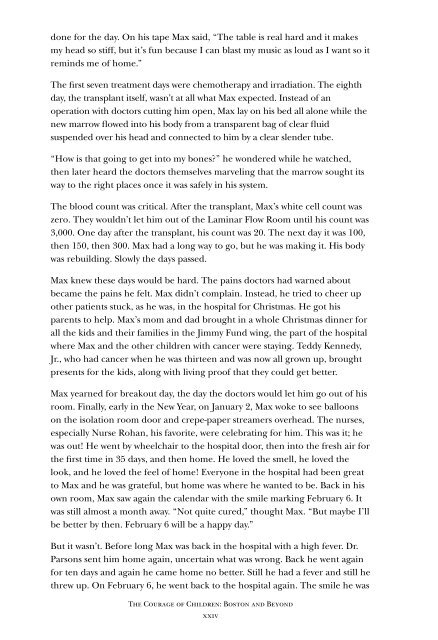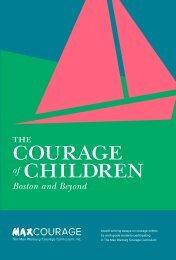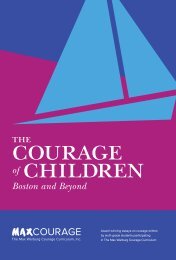The Courage of Children: Boston and Beyond XXXI
Award-winning essays on courage written by sixth-eight grade students participating in The Max Warburg Courage Curriculum.
Award-winning essays on courage written by sixth-eight grade students participating in The Max Warburg Courage Curriculum.
You also want an ePaper? Increase the reach of your titles
YUMPU automatically turns print PDFs into web optimized ePapers that Google loves.
done for the day. On his tape Max said, “<strong>The</strong> table is real hard <strong>and</strong> it makes<br />
my head so stiff, but it’s fun because I can blast my music as loud as I want so it<br />
reminds me <strong>of</strong> home.”<br />
<strong>The</strong> first seven treatment days were chemotherapy <strong>and</strong> irradiation. <strong>The</strong> eighth<br />
day, the transplant itself, wasn’t at all what Max expected. Instead <strong>of</strong> an<br />
operation with doctors cutting him open, Max lay on his bed all alone while the<br />
new marrow flowed into his body from a transparent bag <strong>of</strong> clear fluid<br />
suspended over his head <strong>and</strong> connected to him by a clear slender tube.<br />
“How is that going to get into my bones?” he wondered while he watched,<br />
then later heard the doctors themselves marveling that the marrow sought its<br />
way to the right places once it was safely in his system.<br />
<strong>The</strong> blood count was critical. After the transplant, Max’s white cell count was<br />
zero. <strong>The</strong>y wouldn’t let him out <strong>of</strong> the Laminar Flow Room until his count was<br />
3,000. One day after the transplant, his count was 20. <strong>The</strong> next day it was 100,<br />
then 150, then 300. Max had a long way to go, but he was making it. His body<br />
was rebuilding. Slowly the days passed.<br />
Max knew these days would be hard. <strong>The</strong> pains doctors had warned about<br />
became the pains he felt. Max didn’t complain. Instead, he tried to cheer up<br />
other patients stuck, as he was, in the hospital for Christmas. He got his<br />
parents to help. Max’s mom <strong>and</strong> dad brought in a whole Christmas dinner for<br />
all the kids <strong>and</strong> their families in the Jimmy Fund wing, the part <strong>of</strong> the hospital<br />
where Max <strong>and</strong> the other children with cancer were staying. Teddy Kennedy,<br />
Jr., who had cancer when he was thirteen <strong>and</strong> was now all grown up, brought<br />
presents for the kids, along with living pro<strong>of</strong> that they could get better.<br />
Max yearned for breakout day, the day the doctors would let him go out <strong>of</strong> his<br />
room. Finally, early in the New Year, on January 2, Max woke to see balloons<br />
on the isolation room door <strong>and</strong> crepe-paper streamers overhead. <strong>The</strong> nurses,<br />
especially Nurse Rohan, his favorite, were celebrating for him. This was it; he<br />
was out! He went by wheelchair to the hospital door, then into the fresh air for<br />
the first time in 35 days, <strong>and</strong> then home. He loved the smell, he loved the<br />
look, <strong>and</strong> he loved the feel <strong>of</strong> home! Everyone in the hospital had been great<br />
to Max <strong>and</strong> he was grateful, but home was where he wanted to be. Back in his<br />
own room, Max saw again the calendar with the smile marking February 6. It<br />
was still almost a month away. “Not quite cured,” thought Max. “But maybe I’ll<br />
be better by then. February 6 will be a happy day.”<br />
But it wasn’t. Before long Max was back in the hospital with a high fever. Dr.<br />
Parsons sent him home again, uncertain what was wrong. Back he went again<br />
for ten days <strong>and</strong> again he came home no better. Still he had a fever <strong>and</strong> still he<br />
threw up. On February 6, he went back to the hospital again. <strong>The</strong> smile he was<br />
<strong>The</strong> <strong>Courage</strong> <strong>of</strong> <strong>Children</strong>: <strong>Boston</strong> <strong>and</strong> <strong>Beyond</strong><br />
xxiv<br />
now famous for was still there, but it seemed to waver at the corners <strong>of</strong> his<br />
mouth. Max went back to his isolation room <strong>and</strong> this time he would have an<br />
oxygen mask, the sign <strong>of</strong> mortal struggle.<br />
Max’s mom <strong>and</strong> dad <strong>and</strong> Fred were at the hospital every day, staying with<br />
him until the evening when Max, heavy with drugs, fell asleep. <strong>The</strong> long<br />
days in the hospital were hard on Fred. He played with Max, but it wasn’t<br />
like the last time Max was in the hospital. One day, sick <strong>and</strong> exhausted after<br />
a treatment, Max was being pushed back to his room in the wheelchair.<br />
Fred had had it. Right on the edge <strong>of</strong> crying, he pulled hard on his mother’s<br />
arm, making it difficult for her to push Max’s chair. “Come on, Fred. Max<br />
needs you to help out,” she said.<br />
Max was used to being the helper himself. Knowing he was needed, he said,<br />
“I can cheer Fred up. Put him here in my lap.”<br />
Fred went into his older brother’s lap, glad to be riding the long corridor <strong>and</strong><br />
glad to have Max acting like his old self. <strong>The</strong> two rolled along, Max’s head<br />
hidden <strong>and</strong> arms waving out from under Fred’s armpits, a four-armed,<br />
laughing pair all the way from Pulmonary to the Transplant floor. Hearing<br />
them, the nurses couldn’t tell that one <strong>of</strong> the laughing boys was perilously ill<br />
until, rounding the corner, they recognized Max <strong>and</strong> his family.<br />
“That’s like Max,” they told his mother. “At night on the transplant floor, the<br />
younger kids cry. <strong>The</strong>y’re in pain <strong>and</strong> they miss their families. I hear Max call<br />
to them, ‘Don’t cry. I’m here. You’ve got a friend!’ You have an unusually<br />
brave son, Mrs. Warburg.”<br />
“I’m not sure he realizes,” his mother said. “He says to me, ‘Mommy, do you<br />
think I’m brave?’ I don’t know why he doubts.”<br />
“How does he keep his laughter? How can he keep on smiling?”<br />
“That’s Max,” said his mom. “That’s the way Max is.”<br />
On March first Dr. Parsons told Max his life was threatened. <strong>The</strong> blood<br />
transfusions <strong>and</strong> medicines pumped into him weren’t working well enough.<br />
<strong>The</strong> doctors’ skills <strong>and</strong> the hospitals’ resources <strong>and</strong> Max’s own incredible will<br />
were losing against the disease. Max saw the solemn faces around him. His<br />
body swollen in places, emaciated in places, spotted with sores in places, Max<br />
looked Dr. Parsons straight in the eyes <strong>and</strong> said, “Well, okay, so what’s the<br />
plan? How are you going to get me well?” <strong>The</strong>y looked at Max in disbelief, to<br />
see his conviction so strong despite his ordeal, <strong>and</strong> took heart themselves.<br />
“Come here to the window, Max, come look,” said his father.<br />
Volume <strong>XXXI</strong><br />
xxv









